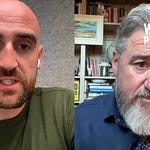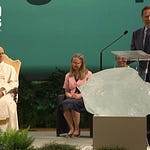With COP29 in a few days, all eyes turn to Baku, a city with a complex relationship to fossil fuels, where 125 years ago, nearly half the world’s oil was produced. Today, Azerbaijan finds itself hosting the world’s largest climate summit, a moment that exposes both the country's potential as a climate leader and the contradictions of its role as a petrostate. In this episode of Wicked Problems – Climate Tech Conversations, I sat down with Ruth Townend, Senior Research Fellow in Climate Diplomacy and Risk at Chatham House and host of their Climate Briefing podcast, who is also the lead author of Azerbaijan’s Climate Leadership Challenge – a timely report for your reading list before COP29 that examines Azerbaijan’s climate policy ambitions and the hurdles it faces as host.
We explore:
The Geopolitics of Climate Leadership: Ruth provides a nuanced view of how Azerbaijan emerged as the host in the Eastern European bloc, a decision shaped by its ongoing tensions with Armenia and the vetoes within the UN. While many argue that a petrostate like Azerbaijan is an unlikely steward of global climate talks, Ruth makes the case for why bringing these complex issues directly to the table may be essential for progress.
Fossil Fuels and the Path Forward: Azerbaijan’s commitment to green leadership is complicated by its economic reliance on fossil fuels. Ruth dives into the difficult balancing act Azerbaijan must navigate between its climate pledges and its plans to expand gas exports to the EU as a replacement for Russian energy supplies. This paradox, she argues, is emblematic of the global climate transition’s challenges and underscores the importance of engaging oil-rich nations in the climate conversation.
COP29’s Key Test: Climate Finance: Ruth and I also discuss one of the summit’s focal points: securing climate finance for vulnerable countries. She lays out how the "new collective quantified goal" on climate finance is expected to replace the current (and much-contested) $100 billion annual pledge. This funding is essential to support developing nations in their own climate transitions. Yet, with consensus far from achieved, Ruth shares her cautious optimism on what it will take for COP29 to deliver on its promise of meaningful financial commitments.
This episode is a must-listen for anyone interested in the intersection of climate policy, geopolitics, and the intricacies of international diplomacy. Ruth’s insights challenge the simplistic narratives about oil-producing nations’ roles in climate negotiations and make a compelling case for why Azerbaijan’s role in COP29 might be more pivotal than expected.
Key Takeaways from Azerbaijan’s Climate Leadership Challenge
Ruth’s report is essential reading for anyone headed to Baku. Some highlights include:
The Leadership Dilemma: Azerbaijan has worked to position itself as a leader on the global environmental stage, but this role comes with expectations. As Ruth explains, the country’s environmental initiatives, like its recent bid to host the 2026 UN World Environment Day, are steps toward credibility—but they’re just the beginning.
The Fossil Fuel Profit Fund: A unique aspect of Azerbaijan’s approach to climate finance is its “CFAF” fund, a move to channel a portion of fossil fuel profits toward climate action. While the current funding target is small, Ruth suggests that scaling such funds might create a viable way for oil-producing states to contribute more substantially to the climate transition.
The Role of the COP Presidency: Ruth’s report calls for the UNFCCC to define clearer guidelines for COP presidents, whose influence has grown in recent years. Azerbaijan’s leadership will be judged by its ability to facilitate inclusive, transparent discussions—particularly challenging in a region with a history of civil society crackdowns.
As COP29 nears, there’s no better time to dive into the full report. You can read Azerbaijan’s Climate Leadership Challenge here, or listen to the episode for Ruth’s insights on what we should expect from this pivotal summit.














